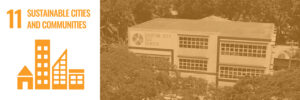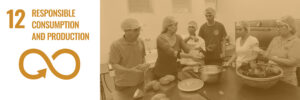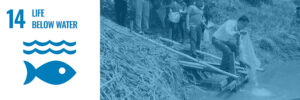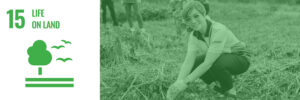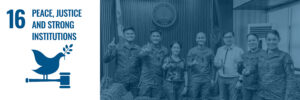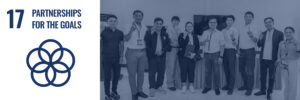2023 – Reports | SDG 9 – Industry, Innovation and Infrastructure

RESEARCH INCOME FROM INDUSTRY AND COMMERCE
Universities serve as source of knowledge, technologies and other resources in today’s innovation-driven society. The presence of technology business incubator inside the university strengthens its capability to link with government and non-government agencies, industry and society. In essence, TBIs act as an accelerator of commercialization of the research outcomes, as lead in innovation and as prime mover in creating and enhancing entrepreneurial society. Using TBI model as platform in developing the rural economy, continuous operation and service provision of an incubator is needed. At present, the government has recognized the importance of science and technology in fostering economic growth.
These outputs of S&T are transferred through Republic Act 10055 or the technology transfer law. The law was passed to promote and facilitate the transfer, dissemination, and effective use, management, and commercialization of intellectual property, technology and knowledge for the benefit of national economy and taxpayers. The act also supports entrepreneurship in the country through commercialization of technologies.
The Philippine Innovation Act of 2018 recognizes the importance of an effective and efficient innovation ecosystem that addresses and delivers action in various policy areas, including MSME development, education, trade, investment, finance, and agriculture, sustainable energy, climate change, among others. In essence, incubators help connect science, technology, education, knowledge, entrepreneurial talent, and capital providers within the community. The incubators, therefore, are considered important mechanisms that provide important links in the entrepreneurial value chain at the national and/or regional level.
The Isabela State University, as one of the leading higher education institutions in the Philippines, hosted a technology business incubator for agriculture, aquatic and natural resources sector. Known as DOST-PCAARRD-ISU ATBI, the incubator served as technology commercialization arm of the university since 2017.
In 2023, the DOST-PCAARRD-ISU ATBI The incubator has accepted 15 incubatees and able to introduce and offer 31 mature technologies on livestock, crops, aquatic and food processing through technology adoption and five (5) technologies were successfully transferred through technology licensing. From these technologies, 54 products were developed and improved through the incubator assistance. These products were all locally produced, utilizing the raw materials produced in the farms. Notable improvement on the overall business management was observed, as presented by the business registration, making the entity legal in operation; the quality of products was also improved by the facility accreditation and product registration, the management of intellectual property assets was also boost by trademark registration. These improvements were all due to the technical and business-related trainings conducted by the incubator. Growth in the business was also notable as investment for the start-up and enterprise and commercial-scale food processing facilities were established. The operation of these assisted entities has also channeled 160 jobs.
The incubator has generated funds from technology commercialization as well as funding for the operation of the start-up amounting to Php 21,078,000.00.
NUMBER OF EMPLOYEES
In support to the different innovation activities of the university, the 1,804 employees were tapped. From this number of human resources, 50% are academic staff, in which 398 belonged to STEM, 100 to Medicine and 404 were appointed to Arts, Humanities and Social Sciences.
ENFORCING COUNTRYSIDE DEVELOPMENT THROUGH ISU KIST PARKS
Many countries have established science parks and technology districts as part of a strategy to develop new engines of growth. Science parks were generally established with two primary objectives in mind. The first objective of a science park is to be a seedbed and an enclave for technology, and “to play an incubator role, nurturing the development and growth of new, small, high-tech firms, facilitating the transfer of university know-how to tenant companies, encouraging the development of faculty-based spinoffs and stimulating the development of innovative products and processes.” The second objective is to act as a catalyst for regional economic development or revitalization, and to promote economic growth.
Many Asian countries, including the Philippines are to invest and develop science parks with these objectives in mind. Some governments had also hoped that they will also help to: (a) raise the level of technological sophistication of local industries, through the promotion of industrial R&D; (b) promote foreign investments, especially in higher value-added activities; and (c) accelerate the transition from a labor-intensive to a knowledge intensive economy.
Philippine HEIs in the country wants to venture with PEZA in the creation of KIST Park. In partnership with the Philippine Economic Zone Authority (PEZA) and the identified host of Cagayan Valley Region’s Special Economic Zone (SEZ) Institute, ISU now sets in motion some initial plans for the concept of the KIST Park and extend the concept of eco-zone in the region. The innovation park is among the flagship projects of PEZA which aims to establish sustainable economic zones for the thriving of business and commercial sectors anchored on the concept of rural development among communities. In doing so, the University has strategically identified niche areas among its campuses to house the emerging KIST Parks.
SPIN-OFF
The presence of spin-off companies in the university is one of the indicators of successful innovation creation. To date, there are two spin-off companies established by the university, in order to fast-track the commercialization of the research outputs.
Clevermatic Farming Equipment Trading
Clevermatic Farming Equipment Trading (CFET) is owned and managed by Dr. Januel P. Floresca, a faculty researcher at the College of Agriculture, Isabela State University, Echague Campus. The company was duly registered with the Department of Trade and Industry on August 23, 2019, with business address at St. James Subdivision, Venus Street, Batal, Santiago City.
CFET is envisioned to become an established company in the field of automatic farming equipment, complemented by its mission to develop, promote, and commercialize innovative automatic technologies, systems, and devices designed to address the challenges of climate change adaptation, mitigation, and sustainable agriculture. To make this mission became into reality, the company aims for the following:
- production, patenting, and marketing of automatic farming technologies, systems, and devices, such as the Intermittent Mist Propagator, which serves to preserve natural resources, mitigate climate change vulnerabilities, and reduce greenhouse gas (GHG) emissions.
- establish demonstration farms dedicated to showcasing automatic farming technologies, systems, and devices that contribute to the conservation of natural resources, the reduction of climate change vulnerabilities,
- mitigation of GHG emissions.
To date, the company, through its intermittent mist propagator, has served farmer-beneficiaries of the local government units of Gonzaga, Cagayan and Maddela, Quirino and Farmers’ Association with 174 members at Saguday, Quirino Province.


JNN Training Consultancy Services
JNN Training Consultancy Services provides consultancy and training services for researchers and Micro, Small, and Medium-size Enterprises (MSMEs) through coaching and mentoring activities on business innovation and provision of standard business services. The spin-off was established by Dr. Jonathan N. Nayga, professor of the College of Agriculture, ISU, Echague, Isabela.
Potential clients include MSMEs, businessmen, cooperatives, existing companies, government agencies like DOST, DTI, DOLE, CDA, DA, SUCs, and LGUs, and new or start-up businesses. At present, there is no private company offers the same services offered by the spin-off company in the region.

Drolly’s Holistic Therapy and Training Center
Drolly’s Holistic Therapy and Training Center is a spin-off company owned and managed by Dr. Drolly P. Claravall, a faculty member at ISU Ilagan Campus. The center serves the needs of clients suffering from various illnesses that cause bodily pain, requiring proper care and therapy. It also responds to health emergencies, making it a primary concern for authorities and promoting health and wellness for all.
As a sports enthusiast and a pioneer in “blading therapy,” Dr. Drolly invented a hand-held massage tool/blade. Using this tool, she participated in the 2021 Gintong Gawad, a National Search for Outstanding and Inspiring Contributions to Women in grassroots and communities, and received the prestigious award “Makabago at Natatanging Produktong Pang-Isports,” bestowed by the Philippine Sports. Over time, it became an accredited TESDA Training Center for Basic Care Services NC II, with a focus on managing chronic and acute body pain using the Hand-held massage tool. To date, 48 Barangay Health Workers have been trained in this program.
Dr. Claravall invention of an ergonomically designed handheld massage tool has led to the bestowal of Civil Service Commission Pag-asa Award in 2023.













